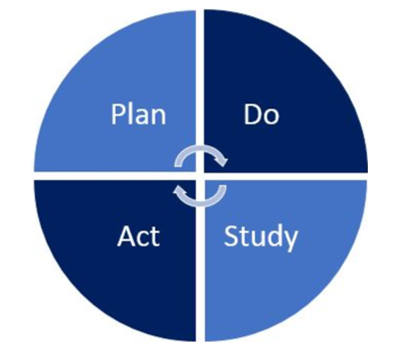Quality Improvement: Plan, Do, Study, Act
About PDSAs
These are a QI tool that can be used to test a change idea by trailing it on a small scale and assessing its impact. This tool is a natural follow on from the driver diagram. PDSAs can assists your team in gaining knowledge about what happens when you do something different in a system.

Supporting protocol – how you might use this tool:
When adapting and implementing a local mental health and substance use protocol, this tool can assist with:
- Planning: what is to be tested, including questions, predictions, and plans for data collection
- Doing: carry out the tests of change according to the plan, recording any observations and expected/unexpected outcomes
- Studying: comparing your data against your predictions
- Acting: decide about the next steps
Use of the PSDA tool will assist will implementing an iterative structure for testing change ideas, offering real time data on how your change is impacting the system. This tool will also allow for real time adaptations or refinements to your change ideas and ensure that locally adapted protocols can be implemented in a way that suits services and service users.
Using PSDAs
While PDSA cycles can be used throughout your improvement work, these will not require workshops or sessions to utilise these in practice. However, your team will need to meet or schedule check ins on a regular basis to review and refine your PDSA cycles and ascertain if your changes are making improvements in the system. These meetings or check ins will work best in person and your team will need to identify who will record and maintain the data needed for completion of the PDSA. The resources section has further tools and guidance to support your planning.
What you need to do before
- Use previous knowledge gained through use of other tools and agree the areas that you would like to use for your PDSA cycles.
What you will need to do during
- Use the resources and templates in the QI Zone to help you with your PDSA cycles.
- Accurately capture information in each section of the PSDA.
- Meet regularly to review and refine your PSDA cycles.
- Use a lessons learned log to capture your learning throughout the process.

Who should be involved
- Staff from mental health and substance use services, or the specific service that you are testing your change in.
What to do after
- If your changes result in an improvement, begin to implement these into business-as-usual practices.
- Share your learning more widely in the system.
